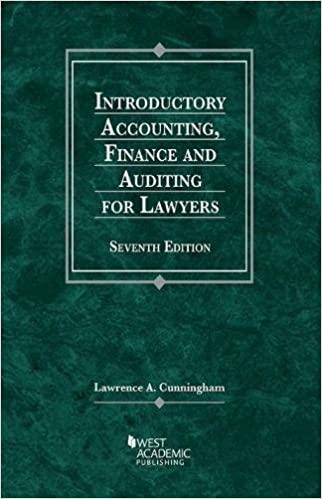The following transaction occurred for Zeta Video Game Supplies during the period ended 12/31/x1. They provide services to customers and sell products. March 1 The
The following transaction occurred for Zeta Video Game Supplies during the period ended 12/31/x1. They provide services to customers and sell products.
March 1 The company was formed with 5,000,000 shares authorized - $1 par value.
March 20 The company issued 450,000 shares of (no-par value) stock at $1.50 a share stock.
April 7 Created a unique game chair applied for a patent legal costs were $5,000.
April 28 Found a close out deal and purchased two years of office supplies for $3,200 on account.
May 1 Purchase a cash register, counter, and some shelving for the store with a Note Payable of $70,000 due in 5 years. The company used the straight-line method for depreciation. The note requires annual principal payment of $10,000 and has an interest rate of 5%.
May 10 Purchased video game for inventory for $85,000 on account. The company uses the FIFO method under a perpetual system to account for inventory.
May 31 Purchase two parcels of land for $115,000 - Parcel A was $30,000 and Parcel B was $85,000. Parcel A was used to build a storage facility. Parcel B is next door to the store. The intention is to have extra land to build a parking lot one day, but the owner does not have any immediate plans to start building.
June 1 Purchased two years of Insurance for $12,000.
June 26 Sold some video games to a customer for $20,000. Inventory had a cost of $8,200. The customer paid $9,000 cash and the rest on account.
July 7 Sold vintage video game systems to a customer for $45,000 to a customer for cash. Inventory had a cost of $22,400.
July 26 Paid employee wages of $10,500.
August 9 A customer gave the store a deposit of $8,000 for to have several retro video games systems repaired. It was uncertain if all the needed parts could be located so no promises were made but the store said they would try.
August 17 Customer purchased $14,000 on video games on account. Inventory had a cost of $4,700.
Sept 10 Invested $12,000 of excess cash in securities intend to hold them for several years.
Sept 21 Collected $6,000 from a customer that owed you money for goods previously purchased.
Sept 29 Sold one of the shelving units purchased on May 19th. The shelf cost $3,000 and was sold for $2,000.
Oct 1 Landlord offered a big discount so paid one year of store rent for $18,000.
Oct 19 Received a dividend check on investments of $1,200
Nov 8 Received a utility bill for $2,100 for utility services received. (Paid on account)
Nov 27 Paid $3,500 of the amount owed for supplies.
Dec 15 Paid dividend to shareholders of $8,000.
Chart of Accounts (You can add additional accounts as needed) 100 Cash 300 Common Stock 110 Account Receivable 310 Retained Earnings 120 Inventory 320 Dividends 125 Supplies 400 Service Revenue 130 Prepaid Insurance 410 Dividend Income 140 Prepaid Rent 450 Gain on Sales 150 Marketable Securities 160 Equipment 500 Cost of Goods Sold 165 Accumulated Depreciation 510 Salary Expense 170 Land 515 Rent Expense 175 Land held as investment 520 Utilities Expense 180 Patent 530 Depreciation Expense 190 Interest Receivable 540 Insurance Expense 200 Account Payable 550 Supplies Expense 220 Salary Payable 560 Income Tax Expense 230 Utilities Payable 570 Interest Expense 240 Unearned Revenue 590 Loss on Sale 250 Note Payable 260 Taxes Payable 270 Interest Payable
You will prepare the following in excel:
Ledger T accounts a. Show beginning balance
b. Post all activity make sure to include reference to journal entry
c. Show ending balance
An Unadjusted Trial Balance.
Step by Step Solution
There are 3 Steps involved in it
Step: 1

See step-by-step solutions with expert insights and AI powered tools for academic success
Step: 2

Step: 3

Ace Your Homework with AI
Get the answers you need in no time with our AI-driven, step-by-step assistance
Get Started


